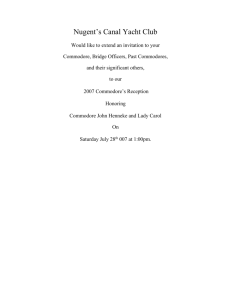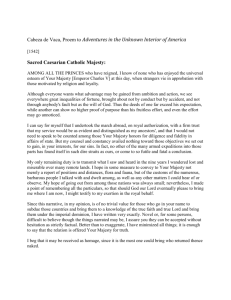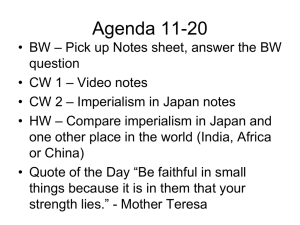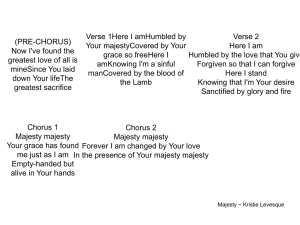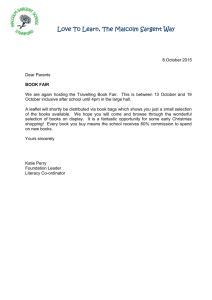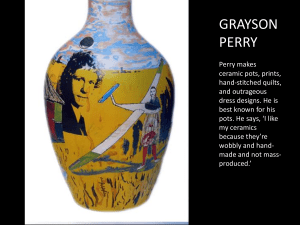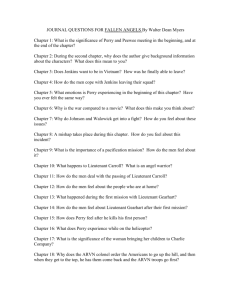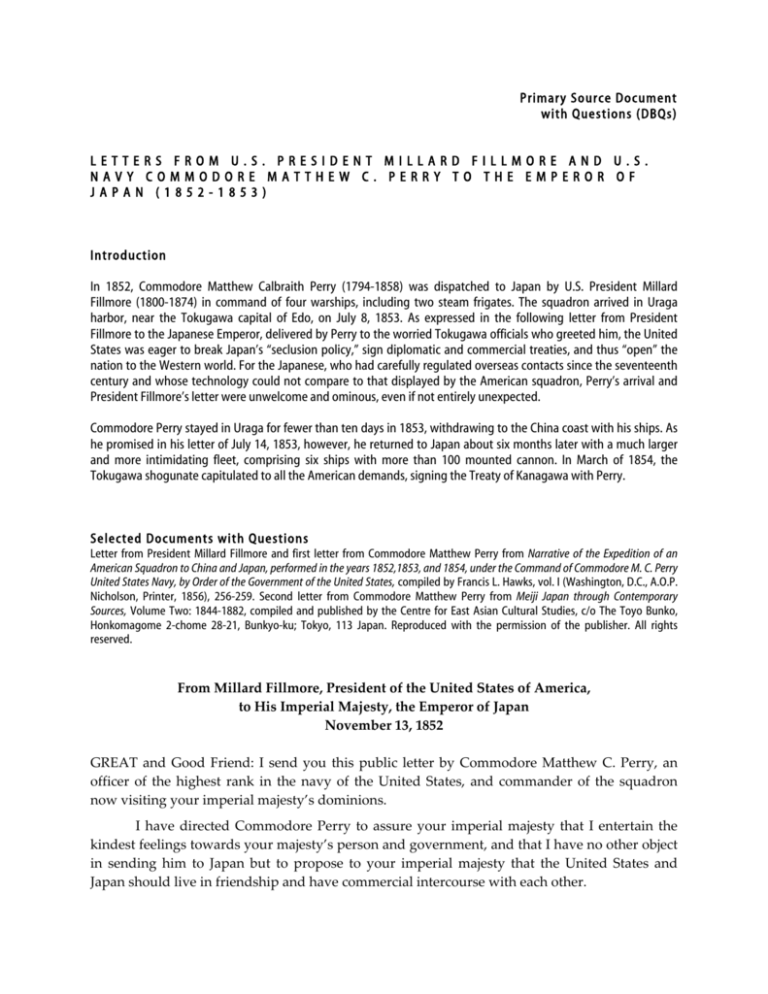
Primary Source Document
with Questions (DBQs)
LETTERS FROM U.S. PRESIDENT MILLARD FILLMORE AND U.S.
NAVY COMMODORE MATTHEW C. PERRY TO THE EMPEROR OF
JAPAN (1852-1853)
Introduction
In 1852, Commodore Matthew Calbraith Perry (1794-1858) was dispatched to Japan by U.S. President Millard
Fillmore (1800-1874) in command of four warships, including two steam frigates. The squadron arrived in Uraga
harbor, near the Tokugawa capital of Edo, on July 8, 1853. As expressed in the following letter from President
Fillmore to the Japanese Emperor, delivered by Perry to the worried Tokugawa officials who greeted him, the United
States was eager to break Japan’s “seclusion policy,” sign diplomatic and commercial treaties, and thus “open” the
nation to the Western world. For the Japanese, who had carefully regulated overseas contacts since the seventeenth
century and whose technology could not compare to that displayed by the American squadron, Perry’s arrival and
President Fillmore’s letter were unwelcome and ominous, even if not entirely unexpected.
Commodore Perry stayed in Uraga for fewer than ten days in 1853, withdrawing to the China coast with his ships. As
he promised in his letter of July 14, 1853, however, he returned to Japan about six months later with a much larger
and more intimidating fleet, comprising six ships with more than 100 mounted cannon. In March of 1854, the
Tokugawa shogunate capitulated to all the American demands, signing the Treaty of Kanagawa with Perry.
Selected Documents with Questions
Letter from President Millard Fillmore and first letter from Commodore Matthew Perry from Narrative of the Expedition of an
American Squadron to China and Japan, performed in the years 1852,1853, and 1854, under the Command of Commodore M. C. Perry
United States Navy, by Order of the Government of the United States, compiled by Francis L. Hawks, vol. I (Washington, D.C., A.O.P.
Nicholson, Printer, 1856), 256-259. Second letter from Commodore Matthew Perry from Meiji Japan through Contemporary
Sources, Volume Two: 1844-1882, compiled and published by the Centre for East Asian Cultural Studies, c/o The Toyo Bunko,
Honkomagome 2-chome 28-21, Bunkyo-ku; Tokyo, 113 Japan. Reproduced with the permission of the publisher. All rights
reserved.
From
Millard
Fillmore,
President
of
the
United
States
of
America,
to
His
Imperial
Majesty,
the
Emperor
of
Japan
November
13,
1852
GREAT
and
Good
Friend:
I
send
you
this
public
letter
by
Commodore
Matthew
C.
Perry,
an
officer
of
the
highest
rank
in
the
navy
of
the
United
States,
and
commander
of
the
squadron
now
visiting
your
imperial
majesty’s
dominions.
I
have
directed
Commodore
Perry
to
assure
your
imperial
majesty
that
I
entertain
the
kindest
feelings
towards
your
majesty’s
person
and
government,
and
that
I
have
no
other
object
in
sending
him
to
Japan
but
to
propose
to
your
imperial
majesty
that
the
United
States
and
Japan
should
live
in
friendship
and
have
commercial
intercourse
with
each
other.
Primary Source Document with Questions (DBQs) on
LETTERS FROM U.S. PRESIDENT MILLARD FILLMORE AND
U.S. NAVY COMMODORE MATTHEW C. PERRY TO THE EMPEROR OF JAPAN (1852 -1853)
The
Constitution
and
laws
of
the
United
States
forbid
all
interference
with
the
religious
or
political
concerns
of
other
nations.
I
have
particularly
charged
Commodore
Perry
to
abstain
from
every
act
which
could
possibly
disturb
the
tranquility
of
your
imperial
majesty’s
dominions.
The
United
States
of
America
reach
from
ocean
to
ocean,
and
our
Territory
of
Oregon
and
State
of
California
lie
directly
opposite
to
the
dominions
of
your
imperial
majesty.
Our
steamships
can
go
from
California
to
Japan
in
eighteen
days.
Our
great
State
of
California
produces
about
sixty
millions
of
dollars
in
gold
every
year,
besides
silver,
quicksilver,
precious
stones,
and
many
other
valuable
articles.
Japan
is
also
a
rich
and
fertile
country,
and
produces
many
very
valuable
articles.
Your
imperial
majesty’s
subjects
are
skilled
in
many
of
the
arts.
I
am
desirous
that
our
two
countries
should
trade
with
each
other,
for
the
benefit
both
of
Japan
and
the
United
States.
We
know
that
the
ancient
laws
of
your
imperial
majesty’s
government
do
not
allow
of
foreign
trade,
except
with
the
Chinese
and
the
Dutch;
but
as
the
state
of
the
world
changes
and
new
governments
are
formed,
it
seems
to
be
wise,
from
time
to
time,
to
make
new
laws.
There
was
a
time
when
the
ancient
laws
of
your
imperial
majesty’s
government
were
first
made.
About
the
same
time
America,
which
is
sometimes
called
the
New
World,
was
first
discovered
and
settled
by
the
Europeans.
For
a
long
time
there
were
but
a
few
people,
and
they
were
poor.
They
have
now
become
quite
numerous;
their
commerce
is
very
extensive;
and
they
think
that
if
your
imperial
majesty
were
so
far
to
change
the
ancient
laws
as
to
allow
a
free
trade
between
the
two
countries
it
would
be
extremely
beneficial
to
both.
If
your
imperial
majesty
is
not
satisfied
that
it
would
be
safe
altogether
to
abrogate
the
ancient
laws
which
forbid
foreign
trade,
they
might
be
suspended
for
five
or
ten
years,
so
as
to
try
the
experiment.
If
it
does
not
prove
as
beneficial
as
was
hoped,
the
ancient
laws
can
be
restored.
The
United
States
often
limit
their
treaties
with
foreign
states
to
a
few
years,
and
then
renew
them
or
not,
as
they
please.
I
have
directed
Commodore
Perry
to
mention
another
thing
to
your
imperial
majesty.
Many
of
our
ships
pass
every
year
from
California
to
China;
and
great
numbers
of
our
people
pursue
the
whale
fishery
near
the
shores
of
Japan.
It
sometimes
happens,
in
stormy
weather,
that
one
of
our
ships
is
wrecked
on
your
imperial
majesty’s
shores.
In
all
such
cases
we
ask,
and
expect,
that
our
unfortunate
people
should
be
treated
with
kindness,
and
that
their
property
should
be
protected,
till
we
can
send
a
vessel
and
bring
them
away.
We
are
very
much
in
earnest
in
this.
Commodore
Perry
is
also
directed
by
me
to
represent
to
your
imperial
majesty
that
we
understand
there
is
a
great
abundance
of
coal
and
provisions
in
the
Empire
of
Japan.
Our
steamships,
in
crossing
the
great
ocean,
burn
a
great
deal
of
coal,
and
it
is
not
convenient
to
bring
it
all
the
way
from
America.
We
wish
that
our
steamships
and
other
vessels
should
be
allowed
to
stop
in
Japan
and
supply
themselves
with
coal,
provisions,
and
water.
They
will
pay
for
them
in
money,
or
anything
else
your
imperial
majesty’s
subjects
may
prefer;
and
we
Asia for Educators l Columbia University l http: //afe.easia.columbia.edu
Page 2 of 6
Primary Source Document with Questions (DBQs) on
LETTERS FROM U.S. PRESIDENT MILLARD FILLMORE AND
U.S. NAVY COMMODORE MATTHEW C. PERRY TO THE EMPEROR OF JAPAN (1852 -1853)
request
your
imperial
majesty
to
appoint
a
convenient
port,
in
the
southern
part
of
the
empire,
where
our
vessels
may
stop
for
this
purpose.
We
are
very
desirous
of
this.
These
are
the
only
objects
for
which
I
have
sent
Commodore
Perry,
with
a
powerful
squadron,
to
pay
a
visit
to
your
imperial
majesty’s
renowned
city
of
Edo:
friendship,
commerce,
a
supply
of
coal
and
provisions,
and
protection
for
our
shipwrecked
people.
We
have
directed
Commodore
Perry
to
beg
your
imperial
majesty’s
acceptance
of
a
few
presents.
They
are
of
no
great
value
in
themselves;
but
some
of
them
may
serve
as
specimens
of
the
articles
manufactured
in
the
United
States,
and
they
are
intended
as
tokens
of
our
sincere
and
respectful
friendship.
May
the
Almighty
have
your
imperial
majesty
in
His
great
and
holy
keeping!
In
witness
whereof,
I
have
caused
the
great
seal
of
the
United
States
to
be
hereunto
affixed,
and
have
subscribed
the
same
with
my
name,
at
the
city
of
Washington,
in
America,
the
seat
of
my
government,
on
the
thirteenth
day
of
the
month
of
November,
in
the
year
one
thousand
eight
hundred
and
fifty‑two.
[Seal
attached]
Your
good
friend,
Millard
Fillmore
By
the
President:
Edward
Everett,
Secretary
of
State
Questions:
1. How would you describe the tone of President Fillmore’s letter?
2. Why does the president mention that he has dispatched Perry “with a
powerful squadron”?
3. If you were the emperor of Japan, how would you respond to this letter?
How would you explain and justify the Japanese seclusion policy to
President Fillmore?
Asia for Educators l Columbia University l http: //afe.easia.columbia.edu
Page 3 of 6
Primary Source Document with Questions (DBQs) on
LETTERS FROM U.S. PRESIDENT MILLARD FILLMORE AND
U.S. NAVY COMMODORE MATTHEW C. PERRY TO THE EMPEROR OF JAPAN (1852 -1853)
From
Commodore
Matthew
C.
Perry
to
His
Imperial
Majesty,
the
Emperor
of
Japan
July
7,
1853
United
States
Steam
Frigate
Susquehanna
Off
the
Coast
of
Japan
To
His
Imperial
Majesty,
the
Emperor
of
Japan,
THE
undersigned,
commander‑in‑chief
of
all
the
naval
forces
of
the
United
States
of
America
stationed
in
the
East
India,
China
and
Japan
seas,
has
been
sent
by
his
government
of
this
country,
on
a
friendly
mission,
with
ample
powers
to
negotiate
with
the
government
of
Japan,
touching
certain
matters
which
have
been
fully
set
forth
in
the
letter
of
the
President
of
the
United
States,
copies
of
which,
together
with
copies
of
the
letter
of
credence
of
the
undersigned,
in
the
English,
Dutch,
and
Chinese
languages,
are
herewith
transmitted.
The
original
of
the
President’s
letter,
and
of
the
letter
of
credence,
prepared
in
a
manner
suited
to
the
exalted
station
of
your
imperial
majesty,
will
be
presented
by
the
undersigned
in
person,
when
it
may
please
your
majesty
to
appoint
a
day
for
his
reception.
The
undersigned
has
been
commanded
to
state
that
the
President
entertains
the
most
friendly
feelings
towards
Japan,
but
has
been
surprised
and
grieved
to
learn
that
when
any
of
the
people
of
the
United
States
go,
of
their
own
accord,
or
are
thrown
by
the
perils
of
the
sea,
within
the
dominations
of
your
imperial
majesty,
they
are
treated
as
if
they
were
your
worst
enemies.
The
undersigned
refers
to
the
cases
of
the
American
ships
Morrison,
Lagoda,
and
Lawrence.
With
the
Americans,
as
indeed
with
all
Christian
people,
it
is
considered
a
sacred
duty
to
receive
with
kindness,
and
to
succour
and
protect
all,
of
whatever
nation,
who
may
be
cast
upon
their
shores,
and
such
has
been
the
course
of
the
Americans
with
respect
to
all
Japanese
subjects
who
have
fallen
under
their
protection.
The
government
of
the
United
States
desires
to
obtain
from
that
of
Japan
some
positive
assurance
that
persons
who
may
hereafter
be
shipwrecked
on
the
coast
of
Japan,
or
driven
by
stress
of
weather
into
her
ports,
shall
be
treated
with
humanity.
The
undersigned
is
commanded
to
explain
to
the
Japanese
that
the
United
States
are
connected
with
no
government
in
Europe,
and
that
their
laws
do
not
interfere
with
the
religion
of
their
own
citizens,
much
less
with
that
of
other
nations.
That
they
inhabit
a
great
country
which
lies
directly
between
Japan
and
Europe,
and
which
was
discovered
by
the
nations
of
Europe
about
the
same
time
that
Japan
herself
was
first
visited
by
Europeans;
that
the
portion
of
the
American
continent
lying
nearest
to
Europe
was
first
settled
by
emigrants
from
that
part
of
the
world;
that
its
population
has
rapidly
spread
through
the
country,
until
it
has
reached
the
shores
of
the
Pacific
Ocean;
that
we
have
now
large
cities,
from
which,
with
the
aid
of
steam
vessels,
we
can
reach
Japan
in
eighteen
or
twenty
days;
Asia for Educators l Columbia University l http: //afe.easia.columbia.edu
Page 4 of 6
Primary Source Document with Questions (DBQs) on
LETTERS FROM U.S. PRESIDENT MILLARD FILLMORE AND
U.S. NAVY COMMODORE MATTHEW C. PERRY TO THE EMPEROR OF JAPAN (1852 -1853)
that
our
commerce
with
all
this
region
of
the
globe
is
rapidly
increasing,
and
the
Japan
seas
will
soon
be
covered
with
our
vessels.
Therefore,
as
the
United
States
and
Japan
are
becoming
every
day
nearer
and
nearer
to
each
other,
the
President
desires
to
live
in
peace
and
friendship
with
your
imperial
majesty,
but
no
friendship
can
long
exist,
unless
Japan
ceases
to
act
towards
Americans
as
if
they
were
her
enemies.
However
wise
this
policy
may
originally
have
been,
it
is
unwise
and
impracticable
now
that
the
intercourse
between
the
two
countries
is
so
much
more
easy
and
rapid
than
it
formerly
was.
The
undersigned
holds
out
all
these
arguments
in
the
hope
that
the
Japanese
government
will
see
the
necessity
of
averting
unfriendly
collision
between
the
two
nations,
by
responding
favourably
to
the
propositions
of
amity,
which
are
now
made
in
all
sincerity.
Many
of
the
large
ships‑of‑war
destined
to
visit
Japan
have
not
yet
arrived
in
these
seas,
though
they
are
hourly
expected;
and
the
undersigned,
as
an
evidence
of
his
friendly
intentions,
has
brought
but
four
of
the
smaller
ones,
designing,
should
it
become
necessary,
to
return
to
Edo
in
the
ensuing
spring
with
a
much
larger
force.
But
it
is
expected
that
the
government
of
your
imperial
majesty
will
render
such
return
unnecessary,
by
acceding
at
once
to
the
very
reasonable
and
pacific
overtures
contained
in
the
President’s
letter,
and
which
will
be
further
explained
by
the
undersigned
on
the
first
fitting
occasion.
With
the
most
profound
respect
for
your
imperial
majesty,
and
entertaining
a
sincere
hope
that
you
may
long
live
to
enjoy
health
and
happiness,
the
undersigned
subscribes
himself,
M.
C.
Perry,
Commander‑in‑chef
of
the
United
States
Naval
Forces
in
the
East
India,
China,
and
Japan
seas
Questions:
1. How does the tone of Commodore Perry’s letter to the Emperor differ from
that of President Fillmore’s letter of 1852?
2. Do Perry’s priorities in opening Japan to contact with the United States differ
from those expressed by President Fillmore?
3. What does Perry write that is intended to reassure the Japanese about
America’s intentions? What does he write that might be interpreted as
intimidation?
4. Why does Perry stress that the United States “do not interfere with the
religion of their own citizens, much less with that of other nations” and
emphasize that America is fully separate from the nations of Europe?
Asia for Educators l Columbia University l http: //afe.easia.columbia.edu
Page 5 of 6
Primary Source Document with Questions (DBQs) on
LETTERS FROM U.S. PRESIDENT MILLARD FILLMORE AND
U.S. NAVY COMMODORE MATTHEW C. PERRY TO THE EMPEROR OF JAPAN (1852 -1853)
From
Commodore
Matthew
C.
Perry
[Sent
in
Connection
with
the
Delivery
of
a
White
Flag]
July
14,
1853
For
years
several
countries
have
applied
for
trade,
but
you
have
opposed
them
on
account
of
a
national
law.
You
have
thus
acted
against
divine
principles
and
your
sin
cannot
be
greater
than
it
is.
What
we
say
thus
does
not
necessarily
mean,
as
has
already
been
communicated
by
the
Dutch
boat,
that
we
expect
mutual
trade
by
all
means.
If
you
are
still
to
disagree
we
would
then
take
up
arms
and
inquire
into
the
sin
against
the
divine
principles,
and
you
would
also
make
sure
of
your
law
and
fight
in
defence.
When
one
considers
such
an
occasion,
however,
one
will
realize
the
victory
will
naturally
be
ours
and
you
shall
by
no
means
overcome
us.
If
in
such
a
situation
you
seek
for
a
reconciliation,
you
should
put
up
the
white
flag
that
we
have
recently
presented
to
you,
and
we
would
accordingly
stop
firing
and
conclude
peace
with
you,
turning
our
battleships
aside.
Commodore
Perry
Questions:
1. What do you think happened between the delivery of Perry’s first letter and
this short note?
2. How does the tone of this document differ from Perry’s earlier letter and
President Fillmore’s letter?
3. What do you think the “sin” and “divine principles” that Perry writes of here
are? How do you think the Japanese who received this note would have
understood these terms?
4. If you were the Tokugawa shogun, how serious would you take Commodore
Perry’s threats?
Asia for Educators l Columbia University l http: //afe.easia.columbia.edu
Page 6 of 6

